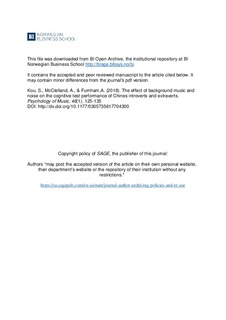| dc.contributor.author | Kou, Siyi | |
| dc.contributor.author | McClelland, Alastair | |
| dc.contributor.author | Furnham, Adrian | |
| dc.date.accessioned | 2018-06-04T06:36:38Z | |
| dc.date.available | 2018-06-04T06:36:38Z | |
| dc.date.created | 2018-05-31T12:28:44Z | |
| dc.date.issued | 2018 | |
| dc.identifier.citation | Psychology of Music. 2018, 46 (1), 125-135. | nb_NO |
| dc.identifier.issn | 0305-7356 | |
| dc.identifier.issn | 1741-3087 | |
| dc.identifier.uri | http://hdl.handle.net/11250/2500086 | |
| dc.description.abstract | Previous research has shown that background auditory distractors (music and sound/noise) have a more severe impact on introverts’ performances on complex cognitive tasks than extraverts (Dobbs, Furnham, & McClelland, 2011). The present study is a partial replication of Dobbs et al., but involving Chinese rather than English participants. Ninety-two Chinese participants (59 female) carried out three cognitive tasks with the presence of Chinese pop songs, background office noise, and silence. The results did not reveal any differences in performance as a function of the distraction condition, nor was there a difference in performance between extraverts and introverts. The failure to replicate is explained in terms of habituation to noisy environments among Chinese participants. | nb_NO |
| dc.language.iso | eng | nb_NO |
| dc.publisher | Sage | nb_NO |
| dc.title | The effect of background music and noise on the cognitive test performance of Chinese introverts and extraverts | nb_NO |
| dc.type | Journal article | nb_NO |
| dc.type | Peer reviewed | nb_NO |
| dc.description.version | acceptedVersion | nb_NO |
| dc.source.pagenumber | 125-135 | nb_NO |
| dc.source.volume | 46 | nb_NO |
| dc.source.journal | Psychology of Music | nb_NO |
| dc.source.issue | 1 | nb_NO |
| dc.identifier.doi | 10.1177/0305735617704300 | |
| dc.identifier.cristin | 1588021 | |
| dc.description.localcode | 2, Forfatterversjon | nb_NO |
| cristin.unitcode | 158,4,0,0 | |
| cristin.unitname | Institutt for ledelse og organisasjon | |
| cristin.ispublished | true | |
| cristin.fulltext | postprint | |
| cristin.qualitycode | 2 | |
